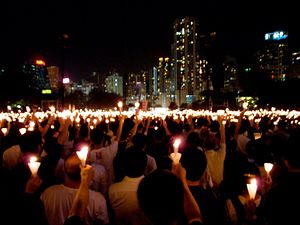Sunday, June 4, was the 28th anniversary of the Tiananmen Square incident. In mainland China it went unreported and, as far as the public view is concerned, was not something to be discussed. In Hong Kong, however, the sentiment is different. While over recent years, public support for remembering Tiananmen has started to shift, many Hong Kongers are still committed to remembering what happened in 1989. This reflects not only their outrage over the event itself, but also concern for their own futures in a Hong Kong under China’s “one country, two systems” model of governance. At the same time, China seems to be increasingly dissatisfied with Hong Kong’s attitude toward the mainland. These differing views do not bode well for President Xi Jinping’s visit to celebrate the 20th anniversary of Hong Kong’s handover from Britain to China less than a month from now.
In Hong Kong over the weekend, while fewer than in the past, there were a number of events to commemorate June 4. For example, a candlelight vigil was conducted at Victoria Park. An annual march, with 110,000 attendees, also took place from Victoria Park to Beijing’s representative office in Hong Kong.
While some argue that localism has undermined Hong Kongers’ sense of solidarity with concerns over democracy in the mainland, for many, the memory of Tiananmen remains strong.
In some segments of the population, however, remembering Tiananmen is not just about something that happened in the past; it is also very much about their own very real future. There is a strong sense of concern that what happened in 1989, and the mainland government’s unwillingness to recognize it publicly, demonstrates that the Chinese government cannot be trusted. In some cases, the feeling is that Hong Kong should be moving toward independence from China.
As some Hong Kong Facebook users noted, Tiananmen Square is an incident that “makes Hong Kongers realise that CCP [Chinese Communist Party] is untrustworthy.” Others commented that “4 June is the starting point of realizing the necessity of Hong Kongers to defend democracy for itself against [the] mainland.” Building on this sentiment, yet other Hong Kong Facebook users posted that “[remembering Tiananmen] is not about Hong Kong independence or pro-Chinese government, it is about Hong Kong!”
The ambivalence in some quarters about Hong Kong’s relationship with the mainland is being met with increasing disappointment and frustration in Beijing. Chinese government officials are drawing unfavorable comparisons between Hong Kong’s attitude and that of another former colony returned to China: Macau.
On May 27, China held a symposium to celebrate the 20th anniversary of implementing the Basic Law of Hong Kong. Zhang Dejiang, a high ranking government and Party official, made remarks during the meeting that the power exercised by Hong Kong under the Basic Law is “delegated by but not separated from the central government.” That is, the Hong Kong part of the two systems model is ultimately under the authority of the Beijing government. Zhang also emphasized that no attempt to separate Hong Kong with its motherland will be tolerated. His messages have been reported extensively by Chinese media in their domestic and Hong Kong special editions.
Earlier in May, Zhang visited Macau. During his visit, Zhang praised the former Portuguese colony as an excellent example of successfully practicing the “one country, two systems” model. Zhang also said that Macau’s success stemmed from the combined efforts of the local and central governments to focus on development and stability — which is no doubt also a message to Hong Kong.
The Chinese government’s position, embodied by Zhang, is being amplified in China’s English-language media. On Monday, the Chinese government-associated Global Times called on Hong Kong to genuinely begin the “long-delayed” process of decolonization from Britain. It suggested Hong Kong think carefully about its position in the nation’s development, and implied that the central government will take a tougher approach to ensure Hong Kong’s stability.
In less than a month, Hong Kongers and mainland views may well collide. On July 1, 1997, Hong Kong was handed back to China after being a British colony for 156 years. On July 1, 2017, Xi Jinping will be in Hong Kong to celebrate the handover of the former colony. No expense is being spared. HK$640 million ($82 million) is being spent to mark the occasion with galas and pyrotechnic displays — approximately twice as much as for the 10th anniversary. However, as responses in Hong Kong to the Tiananmen anniversary suggest, many Hong Kongers are not convinced that Chinese rule will be good for Hong Kong or for them. There may well also be fireworks that the government had not planned.
Wang Zixin provided research assistance for this piece.
Dr. Merriden Varrall is the Director of the East Asia Program at the Lowy Institute.

































